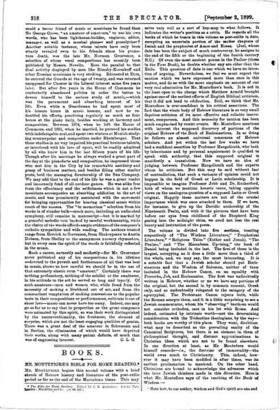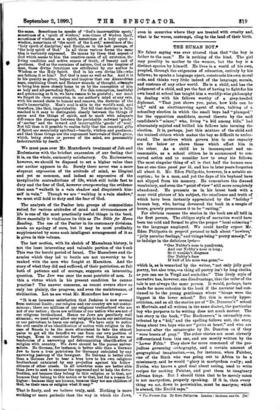BOOKS.
MR. MONTEPIORE'S BIBLE FOR HOME READING.* Mn. MONTEFIORE begins this second volume with a brief sketch of Hebrew history and literature of the post-exilic period as far as the end of the Maccabeau times. This may
• The Bib:e for Home Reading. Elltcd t7 C. G Montague. Second Part loadon : Macmillan nn.1 C.LOa 6d.
• •
, serve very well as a sort of key-map to what follows. It indicates the writer's position as a critic. He regards all the books of which he treats in this volume as post-exilic in date, excepting an uncertain portion of the earlier chapters of Isaiah and the prophecies of Amos and Hosea. (Joel, whose date has been the subject of much controversy, he assigns to the end of the fifth or the beginning of the fourth century B,C.) Of even the most ancient poems in the Psalter (those in the Firat Book), he doubts whether any are older than the Exile. This question of date is one which we have no inten- tion of arguing. Nevertheless, we feel we must repeat the caution which we have expressed more than once in this matter, and do so with the more emphasis on account of our very real admiration for Mr. Montefiore's book, It is not in the least open to the charge which Matthew Arnold brought against one of the earliest efforts of English Biblical criticism, that it did not tend to edification. Still, we think that Mr. Montefiore is over-confident in his critical assertions. The fact that the whole body of Hebrew literature is so very small deprives criticism of its most effective and reliable instru- ment, comparison. And this necessity for caution has been much emphasised by recent events, Mr. Montefiore mentions with interest the supposed discovery of portions of the original Hebrew of the Book of Ecclesiasticus, In so doing he follows an almost universal consensus of Hebrew scholars. And yet within the last few weeks we have had a confident assertion by Professor Margoliouth. who both by inheritance and by personal acquirement is qualified to speak with authority, that this supposed original is manifestly a translation. Now we have no idea of judging between Professor Margolionth and the experts whom he criticises. But this may be said without fear of contradiction, that such a variance of opinion could not happen in the field of Greek or Latin scholarship. It is impossible to imagine Professor Jebb and Dr. Rutherford, both of whom we mention lumcrris cause, taking opposite views on the analogous question of a supposed Latin or Greek original. Happily these matters are not of the crucial importance which was once attached to them. If we have, for instance, to give up the Davidic authorship of the Nineteenth Psalm, and with it the pictures that have been before our eyes from childhood of the Shepherd King gazing into the midnight skies, we need not lose the real beauty and instruction of the poem.
The volume is divided into five sections, treating respectively of "The Wisdom Literature," "Prophetical Literature," "Religious Tales" (Esther and Jonah), "The Psalms," and "The Macca,bean Uprising," the book of Daniel being included in the last. The first of these is the largest, occupying as it does a little more than a third of the whole, and, we may say, the most interesting. It is a notable fact that a Jewish scholar should put Eccle- siasticus and the Wisdom of Solomon, neither of them included in the Hebrew Canon, on an equality with Proverbs, Job, and Ecclesiastes. The first was undoubtedly written in Hebrew, whether or no we have any portions of the original, but the second is. by common consent, Greek only, and so undoubtedly relegated to the category of the apocryphal, The Protestant Canon rejects both, while the Roman accepts them, and it is a little surprising to see a Jewish commentator, whom his "observing" brethren would not consider orthodox, cast in his lot with Rome. And indeed, estimated by intrinsic worth—not the determining consideration with the Tridentine theologians, by the way— both books are worthy of this place, They want, doubtless. what may be described as the prevailing sanity of the Canonical Scriptures, but there is an element in them of philosophical thought, and distinct approximations to Christian ideas which are not to be found elsewhere. In one direction at least, as Mr. Moute6ore would himself concede-1.e., the doctrine of immortality—the world owes much to Christianity. This, indeed, how- ever it may have been modified in after times, was its earliest proclamation to mankind. On the other band, Christians are bound to acknowledge the advances which the later Jewish thinkers made in this direction. Here is what Mr. Montefiore says of the teaching of the Book of Wisdom
"Note how, to our author, wisdom and God's spirit are one and
the same. Sometimes he speaks of 'God's incorruptible spirit,' sometimes of a 'spirit of wisdom,' sometimes of wisdom itself, sometimea of wisdom as a spirit, sometimes of a holy spirit in wisdom, sometimes of 'the spirit of the L ord,' sometimes of the 'holy spirit of discipline,' and finally, as in the last passage, of 'the holy spirit of God.' In all these various forms the same Idea is variously expressed. He means by them that aspect of God which seems to him the creative cause of all existence, the 111/ living condition and active source of truth, of beauty and of goodness. God as the sustainer of nature, God as the inspirer of man, these divine functions are attributed by our author to Wisdom or the Holy Spirit. God in his own divine life—who can fathom it or him ? But God is near as well as far. And it is In his quality as giver, helper and inspirer that our Alexandrian sage, combining Greek and Hebrew strands of thought, attempts to bring him more closely hame to us by the conception of him as holy and all-pervading Spirit, For this conception, healthful and quickening as it is, we have reason to be grateful; nor must we forget its close connexion, in our author's mind at any rate, with his second claim to honour and renown, the doctrine of the soul's immortality. Man's soul is akin to the world's soul, and therefore, like that, imperishable. Not till that doctrine is fully reached is it easy to distinguish clearly between the things of sense and the things of spirit, and to mark with adequate difference the cleavage between the perishable outward goods' of matter and the inward and incorruptible 'goods' of 'soul.' Not till then is it possible to realise fully that the essential gifts of Spirit are essentially spiritual—beauty, wisdom and goodness; and that those things are the supremest bestowals of God's grace, which, being states or powers of the mind, are presumably indestructible by death."
We must pass over Mr. Montefiore's treatment of Job and Ecclesiastes with the briefest expression of our feeling that It is, on the whole, eminently satisfactory. On Ecclesiastes, however, we should be disposed to set a higher value than our author appears to do. Surely there never was a more eloquent expression of the attitude of mind, so illogical and yet so common, and indeed so expressive of the inexplicable contradictions of life, which still holds fast to duty and the fear of God, however overpowering the evidence that man " walketh in a vain shadow and disquieteth him- self in vain." Though we are "walking in a vain shadow," we must still hold to duty and the fear of God.
The analysis of the Psalter into groups of compositions suited for various attitudes of mind and circumstances of life is one of the most practically useful things in the book. Here especially it vindicates its title as The Bible for Home Beading. The use of the Psalter in its customary divisions, needs no apology of ours, but it may be most profitably supplemented by some such intelligent arrangement of it as is given in this volume, The last section, with its sketch of Maocabean history, is not the least interesting and valuable portion of the b ook This was the heroic period of Israel, The Ma.ocabees and the armies which they led to battle are not unworthy to be ranked with the men who fought at Marathon. And the story of what they did and suffered, of their patriotism, Bo full both of patience and of courage, suggests an interesting question. The Jew was once the most patriotic of men. Is this a virtue which in his present condition he cannot practise ? The answer concerns, as recent events show us only too plainly, the progress, and even the maintenance, of civilisation. Let us see what Mr. Montefiore has to say "It is an immense satisfaction that Judaism is now severed from national limits ; our religion and our country are not conter- minous; there are millions of our religious brotherhood who are not of our nation ; there are millions of our nation who are not of our religions brotherhood. Hence we Jews are peculiarly well situated; we need never allow our religion to harm our patriotism or our patriotism to harm our religion. We have only to notice the evil results of an identification of nation with religion in the case of Russia to be the more stimulated to take the utmost pains to get all the benefits we can from our own position of vantage. Even in countries further west than Russia we see tendencies of a narrowing and dehumanising identification of religion with country. We Jews should be the purest aniver- salists. No German, for instance, is better able than a German Jew to have a true patriotism for Germany untainted by any narrowing jealousy of the foreigner. No German is better able than a German Jew to bear a true love to his own religious brotherhood untainted by any prejudice against his fellow Citizens of other creeds. In all countries none are better able than Jews to seek to succour the oppressed and to help the down- trodden, not because they belong to this religion or to that, not because they belong to this nation or to that, but for a reason far higher : because they are human, because they too are children of God, be their race or religion what it may."
That is finely, and we believe truly, said. Nothing is more striking or more pathetic than the way in which the Jews,
even in countries where they are treated with cruelty and, what is far worse, contempt, cling to the land of their birth.



































 Previous page
Previous page